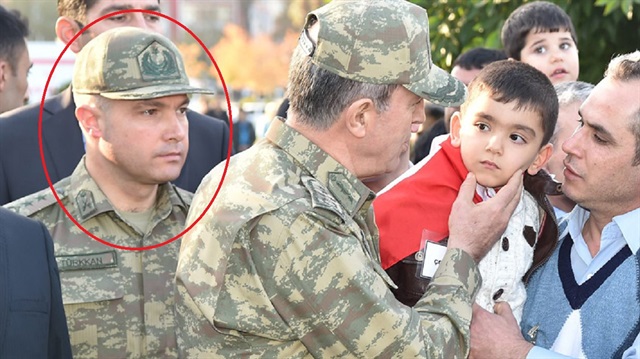
“We regularly wiretapped General Necdet Özel, General Hulusi Akar and General Yaşar Güler," says the adjutant of military chief
Lieutenant Colonel Levent Türkkan, the adjutant of Turkish Chief of General Staff Hulusi Akar, confessed his link with the Gülenist Terrorist Organization (FETÖ) and the involvement in Friday evening's coup attempt.
Türkkan was detained on Wednesday for his alleged link with the coup attempt, that killed at least 240 people and injured more than 1500, and was questioned by Turkish public prosecutors.
According to the investigation records, Türkkan said that he was a member of the Gülen Movement and started acting under the orders and instructions of the Gülenists' “big brothers".
Türkkan comes from an impoverished family and met with the so-called Gülen Movement during his early life, he said, adding that he entered Turkish military with the support of Gülenist offices in the military academy.
“I attended military examination at Işıklar Military academy in 1989. They (FETÖ members) brought a paper which listed the test questions on the night before exam day. And I succeeded to enter the military. After becoming the aide to the military chief, I started working on behalf of the Gülenists," he told investigators.
After appointed at the post of adjutant for the military chief, he started wiretapping former Chief of Staff Necdet Özel and continue it on a regular basis, according to his statement to the investigator.
“The device for wiretapping was provided by an “abi" [big brother]( a common word for the upper position person inside the FETÖ hierarchy), who has been working in Türk Telekom," he said.
Türkkan said he passed the information to Gülenists and had uninterrupted communication with them.
“We regularly wiretapped General Necdet Özel, General Hulusi Akar and General Yaşar Güler."
Türkkan said he learned about the coup attempt at 10 a.m. on Friday, explaining the environment in the military headquarters during the coup attempt.
Türkkan said that Akar had stayed in his office between 8 p.m. and 9 p.m. on Friday.
“Akar made several meetings in the evening. His last meeting was with the National Intelligence Agency (MİT) Chief Hakan Fidan," according to the statement.
“In the afternoon on July 15, I went to Major General Mehmet Dişli's room. He is a Gülenist too."
He told us that he would ask Chief of General Staff Akar if he would like to be "Kenan Evren or not," Türkkan said, and added that Dişli expected Akar to accept the offer.
General Kenan Evren had led the 1980 military coup in Turkey and then became the president in the country.
General Akar refused the offer, saying, “You are making a mistake," until he was taken by Special Forces, according to Türkkan.
“After Hakan Fidan departed, about 20 full equipped members of the Special Forces had entered the military Headquarters."
"I stayed there, and Gen. Dişli called me to tell me to call Gen. Akar's wife," Türkkan said, and added that Hulusi Akar's wife burst into tears when she heard the news.
Türkkan claimed that he regretted participating in the coup when he learned from TV that the Grand National Assembly of Turkey was being bombed and civilians were being killed by junta troops.
“The doings by junta troops were like a massacre," he said.
A group of Turkish soldiers loyal to Gülen attempted a coup on Friday evening with the support of other FETÖ members inside Turkish government institutes. But a combined resistance from Turkish people, politicians and police forces had foiled the attempt.
The Turkish government and Armed Forces said that Fethullah Gülen, who has been living in Pennsylvania for over a decade in self-exile and established a wide network among Turkish state institutes, especially in police, judiciary and military, had planned and arranged the coup by activating his followers hidden inside the military.
Ankara repeatedly shouted for Gülen's extradition and made several requests to Washington, but the US authority rejected the issue.
Following the failed coup attempt, the Turkish public also raised the issue and demanded his extradition more effectively.
The Turkish government has sent four official documents, including some rulings from higher courts in Turkey, to the US authority and demanded his extraction officially.
Turkish government, judiciary and military even opposition political party leaders, along with the public gathered in streets and squares, all said that Gülen was the planner of the failed coup, that killed at least 240 people, mostly civilians and injured over 1500 other, and he should be punished in Turkey.














